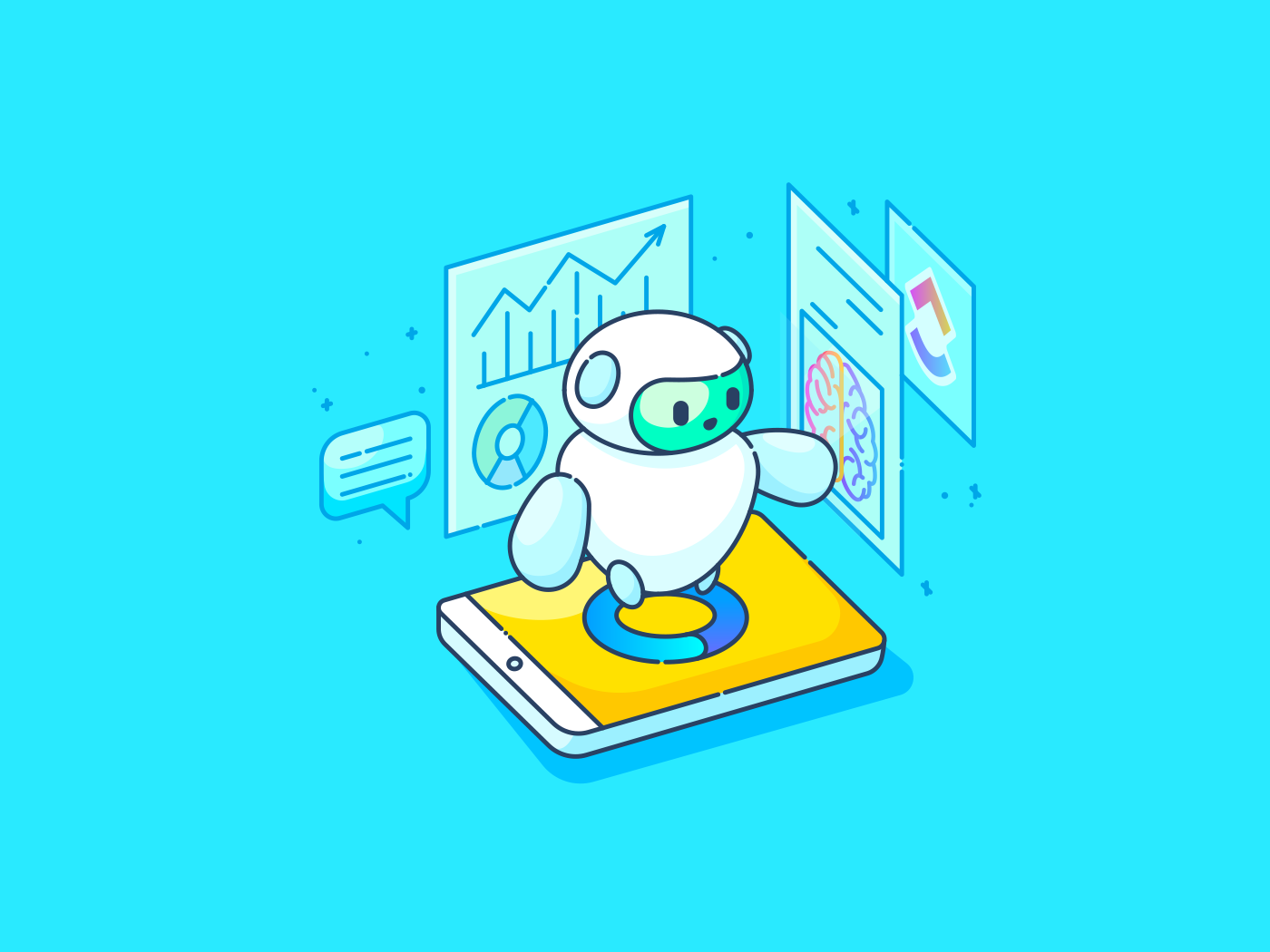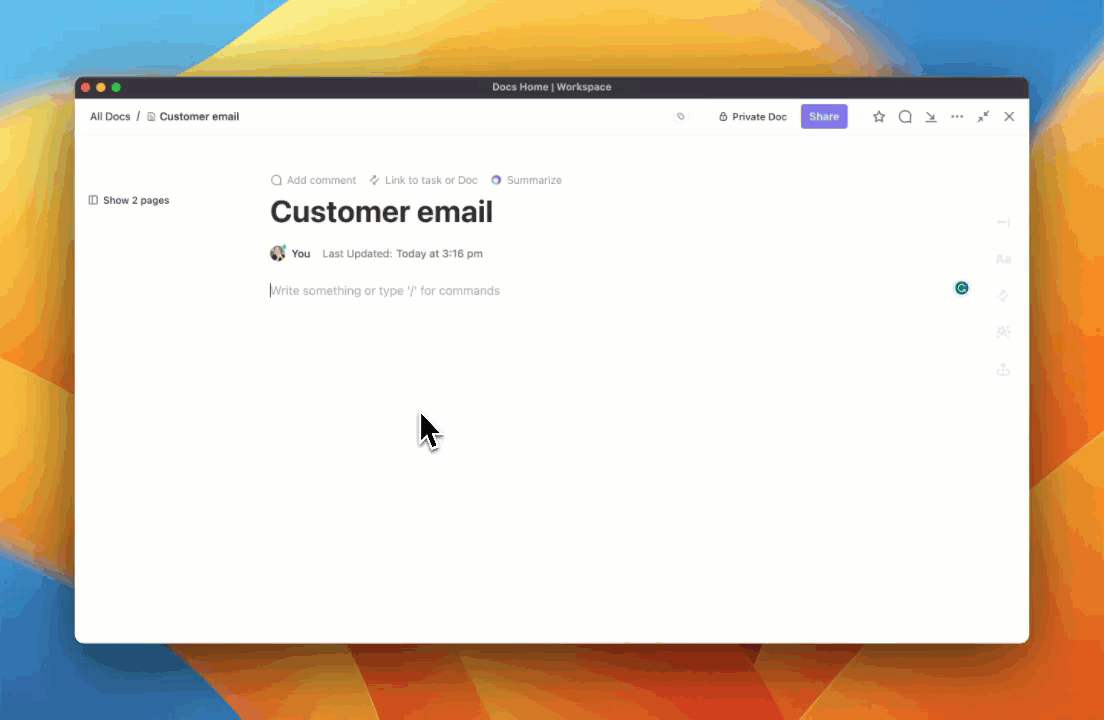Top 10 Enterprise Generative AI Tools Transforming Work in 2026

Sorry, there were no results found for “”
Sorry, there were no results found for “”
Sorry, there were no results found for “”
In today’s day and age, enterprise generative AI tools have gone from “nice-to-have” to mission-critical.
With global AI spending projected to hit $307 billion this year and expected to climb to $632 billion, their role is undeniable. 📈
But here’s the kicker: with great power comes greater scrutiny. Enterprise leaders and IT pros must balance the transformative potential with airtight compliance and security.
To help, we’ve rounded up the top generative AI applications that blend breakthrough innovation with steadfast reliability.
Let’s first explore what to look for when choosing the perfect enterprise generative AI tool for your business.
Here’s our pick of the best gen-AI tools:
1. ClickUp: Best for AI-driven enterprise productivity and innovation
2. OpenAI: Best for multimodal AI with text, image, and future audio functions
3. Google Cloud Vertex AI: Best for enterprise-ready AI development
4. Microsoft Azure OpenAI Service: Best for scaling AI with robust security
5. Cohere: Best for natural language AI models with advanced customization
6. Anthropic: Best for ethical AI systems with advanced reasoning capabilities
7. GitHub Copilot: Best for AI-powered developer productivity and intelligent coding
8. Glean AI: Best for knowledge management and cross-application search
9. Stability AI: Best for open-source AI model customization and generative AI
10. NVIDIA AI: Best for high-performance computing and GPU-accelerated AI
Choosing the right generative AI platform goes beyond the latest tech; it’s about picking the one that aligns effortlessly with your workflow.
Here’s what to consider:
Explore these top AI tools designed to evolve with your business needs—from implementing enterprise project management to improving decision-making and more.

ClickUp, the everything app for work, smoothens your workflows with its unified workspace intelligence.
For instance, ClickUp’s Enterprise AI Solutions integrates project and knowledge management for larger teams with enterprise-grade security, including SSO and HIPAA compliance.
Here’s how the platform saves you time and helps you do more:
ClickUp’s AI agents analyze historical project data to simplify future workflows by:
The platform’s native AI assistant, ClickUp Brain, learns from your workspace activities to improve the relevance of the information it retrieves over time.
Summarily, the AI neural network boosts your productivity by:

ClickUp not only allows us to stay lean—it also enables us to stay informed, deliver innovation, and create added value for our clients

OpenAI offers language models, like GPT-4 and GPT-4o, that use natural language processing to simplify tasks like content creation and chatbot development. Its newly launched O1 series employs “chain-of-thought” reasoning to process information logically and sequentially.
ChatGPT, OpenAI’s flagship tool, centralizes these capabilities for intuitive enterprise communication, with AI prompt templates ensuring consistent outputs.
💡Pro Tip: Combine ChatGPT use cases with automation tools to boost your productivity. For example, ChatGPT can be set up to draft responses or proposals automatically, triggered by events like new client inquiries or task completions.
Google Cloud Vertex AI provides a unified development environment for building, deploying, and scaling AI solutions across various industries. It also integrates easily with Google’s extensive data services, such as BigQuery and Dataflow, helping you manage and analyze large datasets.
🤖 Did You Know: Google Cloud Vertex AI simplifies the development process for data scientists and ML engineers by requiring 80% fewer lines of code to train ML models.
Microsoft Azure OpenAI Service integrates OpenAI’s advanced language models with Microsoft Azure’s robust cloud infrastructure, helping organizations develop, deploy, and scale intelligent AI solutions with enterprise-grade security and compliance.
🤖 Did You Know: Studies on the impact and future of AI highlight its transformative potential, with Generative AI projected to become a $1.3 trillion market over the next decade.

Cohere offers learning language models tailored for diverse NLP tasks, including text generation, classification, and summarization. Its multi-model support ensures flexibility for various AI use cases and applications.
Plus, its ethical AI approach emphasizes transparency, making it a reliable choice for businesses and developers alike.
Read More: Top AI Startups to Watch

Anthropic is dedicated to developing safe, interpretable, and ethically-aligned artificial intelligence systems that prioritize responsible technological advancement.
💡Quick Hack: Create a company AI policy to address ethical risks associated with GenAI technologies, like data privacy violations and data poisoning.

GitHub Copilot is an advanced AI-powered coding assistant that boosts developer productivity by offering context-aware coding support throughout enterprise software development.
Built on OpenAI’s Codex model, Copilot suggests relevant code snippets, functions, and algorithms tailored to the specific project.
Fun Fact: Developers can use GitHub Copilot to send tweets directly from their IDEs. By writing comments related to the Twitter API, Copilot can generate the required code snippets, merging social media with coding workflows.

Glean AI is an enterprise-grade knowledge management platform that transforms organizational information access through context-aware and AI-powered search capabilities.
💡Pro Tip: To maximize efficiency and minimize costs, consider integrating pre-built AI APIs into your existing tools, leveraging AI as a Service (AIaaS) without needing extra infrastructure or coding expertise.

Stability AI is an open-source Gen AI tool dedicated to democratizing advanced AI technologies across multiple modalities. It helps you adopt flexible AI models tailored to your needs, whether for creative content generation, data synthesis, or other innovative applications.
💡Pro Tip: When choosing between LLMs and Generative AI, align the tool with your specific goals. Use LLMs for precision in text-heavy tasks and Generative AI solutions for creative workflows.

NVIDIA AI’s GPU technology provides high-performance computing resources that help organizations train and deploy advanced AI models. It supports various applications, such as deep learning, natural language processing, computer vision, and robotics, and helps optimize processes across industries.
Plus, NVIDIA’s ecosystem includes tools like TensorRT for inference optimization and the NVIDIA Deep Learning SDK, which simplifies the development of AI applications.
Fun Fact: Historical sales data revealed that over 50% of NVIDIA’s total revenue comes from its data center business, highlighting a strategic pivot toward AI and cloud computing solutions.
Adopting generative AI systems makes your workflows smoother, faster, and more connected than ever. But let’s be honest—most tools out there only solve one problem at a time.
That’s where ClickUp can come in handy.
ClickUp’s AI task manager and Brain come together to create magic—from multi-tasking to brainstorming ideas, automating tasks, and keeping your projects on track, all in one platform.
With its user-friendly interface and robust collaboration tools, ClickUp adapts to your needs.
Sign up on ClickUp for free and transform the way you work with AI that grows with you.
© 2026 ClickUp